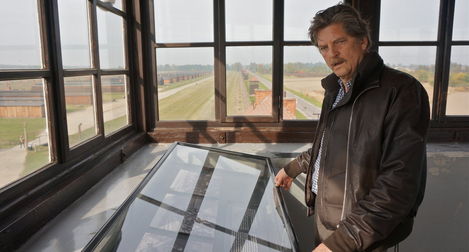André Singer
Anthropologist and documentary filmmaker André Singer has directed Night Will Fall and executive produced The Act of Killing and The Look of Silence. He is currently serving as one of the mentors on the British Council and IMCINE's Docunexion programme, and will travel with us to Mexico City's DF Docs festival this month.
What’s your connection to the British Council?
In a somewhat complicated career in both anthropology and film, my path with the British Council has crossed on frequent occasions. As a research fieldworker in Iran in the 1970s, the British Council office in Tehran was a haven to escape to, and on other journeys abroad both as a filmmaker and as an anthropologist, the links with our cultural outposts were always high on my agenda. Currently the link is through Docunexion, a hugely innovative scheme to help Mexican filmmakers develop projects pertinent in the international marketplace, and to help British filmmakers source projects of relevance to Mexico. Mentoring these talented teams is an exciting process towards international cooperation and it has been a privilege to take part.
What else are you working on?
Having completed a deeply depressing film about mankind's inhumanity to his fellow humans (the feature documentary Night Will Fall about the Holocaust) and having an executive role on Joshua Oppenheimer's equally distressing films about Indonesia (The Act of Killing and The Look of Silence), I seem to be doomed to continue work about such tragic subjects and am currently embarking on a film about the impact of nuclear testing on the people of Kazakhstan.
What originally turned you onto film?
As an anthropologist I had thought I was likely to follow a career in academia until I answered an ad for advisory work for Brian Moser on Granada Television's new Disappearing World series. Once bitten by the film bug at that time, there was no turning back and I decided I was lucky to have found a vocation that I have been able to follow for the next forty years!
What has been your career high so far?
In 1989 I was given the opportunity by the BBC to create and run a film series for international auteur filmmakers and their feature length films. This was then called Fine Cut (later becoming Storyville under the editorship of Nick Fraser). It allowed me the privilege of working with such luminaries as Fred Wiseman, Bob Drew, Werner Herzog, Jean Rouch, Vikram Jayanti, Mike Grigsby, David MacDougall and many others.
What was your first job in the film industry?
A researcher and anthropological advisor to the Disappearing World series. This was an era when the researcher played a crucial role in film and was a coveted career path in its own right.
What's your advice for aspiring filmmakers?
Other than the obvious "don't", it is vital for any prospective filmmaker to both understand the complexity and intense competitiveness in the industry but also to have enough self-faith to realise that with dedication and staying-power they can succeed.
What is your favourite British film? Why?
Charlie Nairn's Ongka's Big Mokka. This was a wonderful documentary made in the 1970s that showed how one garrulous New Guinea highlander had the charisma and humour to cross cultural boundaries and allow a western viewer the ability to empathise with his plight in a society with which we had no experience or knowledge. It is a classic of the anthropological film genre and essential viewing for anyone wanting to grasp the skills of how to portray other societies.
If you could have directed/been involved with any film ever made, which one would it be? Why?
Werner Herzog's Aguirre: Wrath of God although fictional and therefore out of my comfort zone is one of the most hypnotic films ever made. Not just the magnetism of Klaus Kinski but because it was shot in conditions and locations that totally drew the audience in as part of the mad journey the anti-hero was on. This is a film unlike any other and should be part of any filmmaker's masterclass.
What’s the first film you remember seeing? What was so memorable about it?
I doubt if anything here is appropriate but the Saturday morning pictures we went to as children had an indelible effect and I think the mix of Superman and Roy Rogers at the Kilburn Odeon in the late 1950s are etched in my brain.
What’s your favourite line or scene from a film?
Highly unoriginal but the scene in Casablanca never fails to make me misty:
Ilsa: Play it once, Sam. For old times' sake.
Sam: [lying] I don't know what you mean, Miss Ilsa.
Ilsa: Play it, Sam. Play "As Time Goes By."
Sam: [lying] Oh, I can't remember it, Miss Ilsa. I'm a little rusty on it.
Ilsa: I'll hum it for you. Da-dy-da-dy-da-dum, da-dy-da-dee-da-dum...[Sam begins playing]
Ilsa: Sing it, Sam.
Sam: [singing] You must remember this / A kiss is still a kiss / A sigh is just a sigh / The fundamental things apply / As time goes by. / And when two lovers woo, / They still say, "I love you" / On that you can rely / No matter what the future brings-...
Rick: [rushing up] Sam, I thought I told you never to play-...
Favourite screen kiss?
Disney's Lady and the Tramp (with spaghetti included).
Who’s your favourite screen hero and/or villain?
The understatement in the anti-hero characterisation of Bourne, particularly in Paul Greengrass' versions never fails to grip.
Who would play you in the film about your life?
Sacha Baron Cohen
Read more about Docunexion here.


